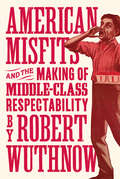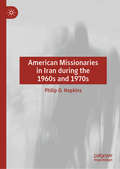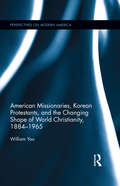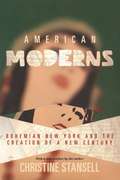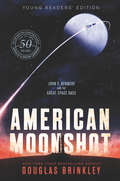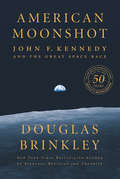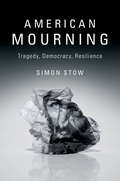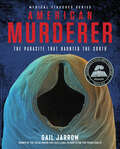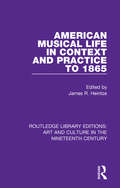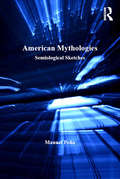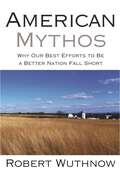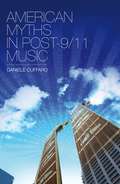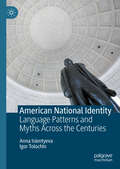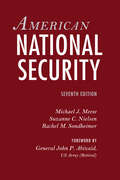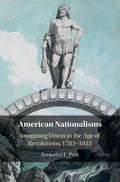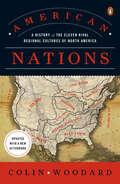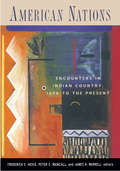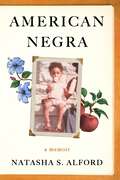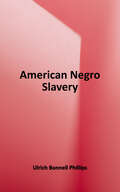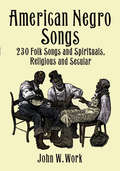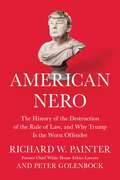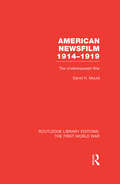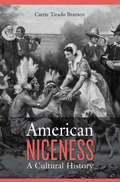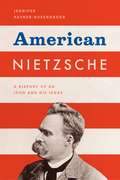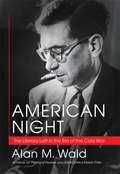- Table View
- List View
American Misfits and the Making of Middle-Class Respectability
by Robert WuthnowHow American respectability has been built by maligning those who don't make the gradeHow did Americans come to think of themselves as respectable members of the middle class? Was it just by earning a decent living? Or did it require something more? And if it did, what can we learn that may still apply?The quest for middle-class respectability in nineteenth-century America is usually described as a process of inculcating positive values such as honesty, hard work, independence, and cultural refinement. But clergy, educators, and community leaders also defined respectability negatively, by maligning individuals and groups—“misfits”—who deviated from accepted norms.Robert Wuthnow argues that respectability is constructed by “othering” people who do not fit into easily recognizable, socially approved categories. He demonstrates this through an in-depth examination of a wide variety of individuals and groups that became objects of derision. We meet a disabled Civil War veteran who worked as a huckster on the edges of the frontier, the wife of a lunatic who raised her family while her husband was institutionalized, an immigrant religious community accused of sedition, and a wealthy scion charged with profiteering.Unlike respected Americans who marched confidently toward worldly and heavenly success, such misfits were usually ignored in paeans about the nation. But they played an important part in the cultural work that made America, and their story is essential for understanding the “othering” that remains so much a part of American culture and politics today.
American Missionaries in Iran during the 1960s and 1970s
by Philip O. HopkinsThis work explores the interaction of American Protestant missionaries with Iranians during the 1960s and 1970s. It focuses on the missionary activities of four American Protestant groups: Presbyterians, Assemblies of God, International Missions, and Southern Baptists. It argues that American missionaries’ predisposition toward their own culture confused their message of the gospel and added to the negative perception of Christianity among Iranians. This bias was seen primarily in the American missionaries’ desire to modernize Iran through education and healthcare, and between the missionaries’ relationship with Iranian Christians. Iranian attitudes towards missionary involvement in these areas are investigated, as is the changing American missionary strategy from a traditional method where missionaries had the final say on most matters related to American and Iranian Christian interaction, to the beginnings of an indigenous system where a partnership developed between the missionary and the Iranian Christian.
American Missionaries, Korean Protestants, and the Changing Shape of World Christianity, 1884-1965 (Perspectives on Modern America)
by William YooThis book examines the partnerships and power struggles between American missionaries and Korean Protestant leaders in both nations from the late 19th century to the aftermath of the Korean War. Yoo analyzes American and Korean sources, including a plethora of unpublished archival materials, to uncover the complicated histories of cooperation and contestation behind the evolving relationships between Americans and Koreans at the same time the majority of the world Christian population shifted from the Global North to the Global South. American and Korean Protestants cultivated deep bonds with one another, but they also clashed over essential matters of ecclesial authority, cultural difference, geopolitics, and women’s leadership. This multifaceted approach – incorporating the perspectives of missionaries, migrants, ministers, diplomats, and interracial couples – casts new light on American and Korean Christianities and captures American and Korean Protestants mutually engaged in a global movement that helped give birth to new Christian traditions in Korea, created new transnational religious and humanitarian partnerships such as the World Vision organization, and transformed global Christian traditions ranging from Pentecostalism to Presbyterianism.
American Moderns: Bohemian New York and the Creation of a New Century
by Christine StansellIn the early twentieth century, an exuberant brand of gifted men and women moved to New York City, not to get rich but to participate in a cultural revolution. For them, the city's immigrant neighborhoods--home to art, poetry, cafes, and cabarets in the European tradition--provided a place where the fancies and forms of a new America could be tested. Some called themselves Bohemians, some members of the avant-garde, but all took pleasure in the exotic, new, and forbidden. In American Moderns, Christine Stansell tells the story of the most famous of these neighborhoods, Greenwich Village, which--thanks to cultural icons such as Eugene O'Neill, Isadora Duncan, and Emma Goldman--became a symbol of social and intellectual freedom. Stansell eloquently explains how the mixing of old and new worlds, politics and art, and radicalism and commerce so characteristic of New York shaped the modern American urban scene. American Moderns is both an examination and a celebration of a way of life that's been nearly forgotten.
American Moonshot Young Readers' Edition: John F. Kennedy and the Great Space Race
by Douglas BrinkleyIn anticipation of the 50th anniversary of the first moon landing, New York Times bestselling author and historian Douglas Brinkley delivers a young readers’ edition of a story rooted in heroism, bravery, and patriotism: America’s race to the moon. July 20, 1969. It’s a day that has earned a spot in history. It’s the day that America was the first nation to succeed in sending two astronauts—Buzz Aldrin and Neil Armstrong—to the moon.But what led to this unforgettable event? What were the stakes riding on the Apollo 11’s safe landing? In acclaimed author Douglas Brinkley’s first young readers' edition, space fans will get the riveting and factual backstory of arguably the most significant achievement of the 20th century.
American Moonshot: John F. Kennedy and the Great Space Race
by Douglas BrinkleyAs the fiftieth anniversary of the first lunar landing approaches, the award winning historian and perennial New York Times bestselling author takes a fresh look at the space program, President John F. Kennedy’s inspiring challenge, and America’s race to the moon. <P><P>“We choose to go to the Moon in this decade and do the other things, not because they are easy, but because they are hard; because that goal will serve to organize and measure the best of our energies and skills, because that challenge is one that we are willing to accept, one we are unwilling to postpone, and one we intend to win.”—President John F. Kennedy <P><P>On May 25, 1961, JFK made an astonishing announcement: his goal of putting a man on the moon by the end of the decade. In this engrossing, fast-paced epic, Douglas Brinkley returns to the 1960s to recreate one of the most exciting and ambitious achievements in the history of humankind. <P><P>American Moonshot brings together the extraordinary political, cultural, and scientific factors that fueled the birth and development of NASA and the Mercury, Gemini and Apollo projects, which shot the United States to victory in the space race against the Soviet Union at the height of the Cold War. <P><P>Drawing on new primary source material and major interviews with many of the surviving figures who were key to America’s success, Brinkley brings this fascinating history to life as never before. <P><P>American Moonshot is a portrait of the brilliant men and women who made this giant leap possible, the technology that enabled us to propel men beyond earth’s orbit to the moon and return them safely, and the geopolitical tensions that spurred Kennedy to commit himself fully to this audacious dream. <P><P>Brinkley’s ensemble cast of New Frontier characters include rocketeer Wernher von Braun, astronaut John Glenn and space booster Lyndon Johnson. <P><P>A vivid and enthralling chronicle of one of the most thrilling, hopeful, and turbulent eras in the nation’s history, American Moonshot is an homage to scientific ingenuity, human curiosity, and the boundless American spirit. <P><b>A New York Times Bestseller</b>
American Mourning: Tragedy, Democracy, Resilience
by Simon StowHow does the way in which a democratic polity mourn its losses shape its political outcomes? How might it shape those outcomes? American Mourning: Tragedy, Democracy, Resilience answers these questions with a critical study of American public mourning. Employing mourning as a lens through which to view the shortcomings of American democracy, it offers an argument for a tragic, complex, and critical mode of mourning that it contrasts with the nationalist, romantic, and nostalgic responses to loss that currently dominate and damage the polity. Offering new readings of key texts in Ancient political thought and American political history, it engages debates central to contemporary democratic theory concerned with agonism, acknowledgment, hope, humanism, patriotism, and political resilience. The book outlines new ways of thinking about and responding to terrorism, racial conflict, and the problems of democratic military return.
American Murderer: The Parasite that Haunted the South (Medical Fiascoes)
by Gail JarrowWhat made workers in the American South so tired and feeble during the 19th and early 20th centuries? This exciting medical mystery uncovers the secrets of the parasite hookworm, commonly known as the &“American Murderer,&” and is the latest title in Gail Jarrow&’s (YALSA Excellence in Nonfiction for Young Adults award-winning author) Medical Fiascoes series.Imagine microscopic worms living in the soil. They enter your body through your bare feet, travel to your intestines, and stay there for years sucking your blood like vampires. You feel exhausted. You get sick easily. It sounds like a nightmare, but that&’s what happened in the American South during the 1800s and early 1900s. Doctors never guessed that hookworms were making patients ill, but zoologist Charles Stiles knew better. Working with one of the first public health organizations, he and his colleagues treated the sick and showed Southerners how to protect themselves by wearing shoes and using outhouses so that the worms didn&’t spread. Although hookworm was eventually controlled in the US, the parasite remains a serious health problem throughout the world. The topic of this STEM book remains relevant and will fascinate readers interested in medicine, science, history—and gross stories about bloodsucking creatures.
American Musical Life in Context and Practice to 1865 (Routledge Library Editions: Art and Culture in the Nineteenth Century #5)
by James R. HeintzeFirst published in 1994. This study covers a wide cross-section of topics, individuals, groups, and musical practices representing various regions and cities. The subjects discussed reflect the religious, ethnic, and social plurality of the American musical experience as well as the impact on cultural society provided by the arrival of new musical immigrants and the internal movements of musicians and musical practices. The essays are arranged principally on the basis of the historical chronology of the cultural practices and subjects discussed. Each article helps to shed additional light on cultural expressions through music in eighteenth- and nineteenth-century America.
American Mythologies: Semiological Sketches
by Manuel PeñaAmerican Mythologies examines eleven myths that form part of the storehouse of present-day American mythologies, elucidating the nature of contemporary myths by investigating their ideological sub-terrain. Grounded in a semiological approach, which explores the displacement of information and the transformation of signs that characterise mythic communication, this book sheds light on the socio-economic, gendered, national and racial interests that lie behind myth-making. Presenting rich case studies from popular culture and public discourse, it demonstrates the manner in which these myths, and American mythology in general, promote the core values of everyday life under capitalism: rugged individualism, the unfettered right to accumulate wealth, the superior moral character of free-enterprise democracy, and its abundant opportunities for every citizen. By the same token, that same mythology negates the corruption endemic to the capitalist social order, an order that also promotes inescapable class, racial, and gender inequalities which confine the majority of Americans to a life of constant economic struggle. A fresh critique of the foundations of American culture, American Mythologies will appeal to those with interests in sociology, social and cultural theory, and cultural and media studies.
American Mythos: Why Our Best Efforts to Be a Better Nation Fall Short
by Robert WuthnowAmerica was built on stories: tales of grateful immigrants arriving at Ellis Island, Horatio Alger-style transformations, self-made men, and the Protestant work ethic. In this new book, renowned sociologist Robert Wuthnow examines these most American of stories--narratives about individualism, immigration, success, religion, and ethnicity--through the eyes of recent immigrants. In doing so, he demonstrates how the "American mythos" has both legitimized American society and prevented it from fully realizing its ideals. This magisterial work is a reflection and meditation on the national consciousness. It details how Americans have traditionally relied on narratives to address what it means to be strong, morally responsible individuals and to explain why some people are more successful than others--in short, to help us make sense of our lives. But it argues that these narratives have done little to help us confront new challenges. We pass laws to end racial discrimination, yet lack the resolve to create a more equitable society. We welcome the idea of pluralism in religion and values, yet we are shaken by the difficulties immigration presents. We champion prosperity for all, but live in a country where families are still homeless. American Mythos aptly documents this disconnect between the stories we tell and the reality we face. Examining how cultural narratives may not, and often do not, reflect the reality of today's society, it challenges readers to become more reflective about what it means to live up to the American ideal.
American Myths in Post-9/11 Music
by Daniele CuffaroAfter September 11, 2001, the void left following the attack on the Twin Towers in the heart of New York was the visible symbol that there was to be a breaking point with the past. The attacks dramatically changed the everyday lives of the American people and the new devastating landscape led people to seek to restore the certainties that had been so suddenly shattered. In doing this, Americans went back to the historical myths in their culture. This book explores the collective memory and historical American myths like, for example, the myth of the innocent nation and the frontier myth, and shows how some of these nationally considered historical truths have not disappeared, but were indeed exhumed in the music produced post-9/11.
American National Identity: Language Patterns and Myths Across the Centuries
by Anna Islentyeva Igor TolochinThis book offers an analytical tool for identifying and analysing the linguistic mechanisms that shape American national identity in public discourses. Drawing on methods from (critical) discourse analysis and corpus linguistics, the authors provide insights into various levels of discourse structures, consider the social and political climate of the US at different stages of its history, trace the diachronic development of the linguistic patterns that shape the American national identity, and conduct a thorough discursive analysis of seminal texts such as The Declaration of Independence and the Preamble to the US Constitution. This book defines the key linguistic markers of the American national identity and provides an insight into how these markers are used to promote various ideologies in the pluralistic world of the contemporary USA. This monograph will be of interest to students and scholars working in fields such as Applied Linguistics, (Critical) Discourse Studies, Cultural Studies, US History and Politics.
American National Security
by Michael J. Meese Suzanne C. Nielsen Rachel M. SondheimerThis classic text provides a rich and nuanced discussion of American national security policymaking.American National Security remains the ideal foundational text for courses in national security, foreign policy, and security studies. Every chapter in this edition has been extensively revised, and the book includes discussion of recent security policy changes in the Trump administration. Highlights include:• An updated look at national security threats, military operations, and homeland security challenges • An analysis of the evolving roles of the president, Congress, the intelligence community, the military, and other institutions involved in national security• A revised consideration of the strengths, limitations, and employment of instruments of national power, including diplomacy, information, economic tools, and armed forces• An exploration of the economic and national security implications of globalization• An enhanced examination of the proliferation of transnational threats, including security challenges in space and in cyberspace• A new assessment of how international, political, and economic trends may change US leadership of the post–World War II international order• A comprehensive update on changing dynamics in key states and regions, including Russia, China, East Asia, the Middle East, South Asia, Europe, Sub-Saharan Africa, and Latin AmericaAn authoritative book that explains US national security policy, actors, and processes in a wide-ranging yet understandable way, American National Security addresses key issues, including challenges to the free and open international order, the reemergence of strategic competition among great powers, terrorism, economic and fiscal constraints, and rapid advances in information and technology.
American Nationalisms
by Benjamin E. ParkAmerica was born in an age of political revolution throughout the Atlantic world, a period when the very definition of 'nation' was transforming. Benjamin E. Park traces how Americans imagined novel forms of nationality during the country's first five decades within the context of European discussions taking place at the same time. Focusing on three case studies - Massachusetts, Pennsylvania, and South Carolina - Park examines the developing practices of nationalism in three specific contexts. He argues for a more elastic connection between nationalism and the nation-state by demonstrating that ideas concerning political and cultural allegiance to a federal body developed in different ways and at different rates throughout the nation. American Nationalisms explores how ideas of nationality permeated political disputes, religious revivals, patriotic festivals, slavery debates, and even literature.
American Nations: A History of the Eleven Rival Regional Cultures of North America
by Colin WoodardAn illuminating history of North America's eleven rival cultural regions that explodes the red state-blue state myth.North America was settled by people with distinct religious, political, and ethnographic characteristics, creating regional cultures that have been at odds with one another ever since. Subsequent immigrants didn't confront or assimilate into an "American" or "Canadian" culture, but rather into one of the eleven distinct regional ones that spread over the continent each staking out mutually exclusive territory.In American Nations, Colin Woodard leads us on a journey through the history of our fractured continent, and the rivalries and alliances between its component nations, which conform to neither state nor international boundaries. He illustrates and explains why "American" values vary sharply from one region to another. Woodard (author of American Character: A History of the Epic Struggle Between Individual Liberty and the Common Good) reveals how intranational differences have played a pivotal role at every point in the continent's history, from the American Revolution and the Civil War to the tumultuous sixties and the "blue county/red county" maps of recent presidential elections. American Nations is a revolutionary and revelatory take on America's myriad identities and how the conflicts between them have shaped our past and are molding our future.From the Hardcover edition.
American Nations: Encounters in Indian Country, 1850 to the Present
by Frederick E. HoxieThis volume brings together an impressive collection of important works covering nearly every aspect of early Native American history, from contact and exchange to diplomacy, religion, warfare, and disease.
American Negra: A Memoir
by Natasha S. AlfordAward-winning journalist Natasha S. Alford grew up between two worlds as the daughter of an African American father and Puerto Rican mother. In American Negra, a narrative that is part memoir, part cultural analysis, Alford reflects on growing up in a working-class family from the city of Syracuse, NY.In smart, vivid prose, Alford illustrates the complexity of being multiethnic in Upstate New York and society’s flawed teachings about matters of identity. When she travels to Puerto Rico for the first time, she is the darkest in her family, and navigates shame for not speaking Spanish fluently. She visits African-American hair salons where she’s told that she has “good” hair, while internalizing images that as a Latina she has "bad” hair or pelo malo.When Alford goes from an underfunded public school system to Harvard University surrounded by privilege and pedigree, she wrestles with more than her own ethnic identity, as she is faced with imposter syndrome, a shocking medical diagnosis, and a struggle to define success on her own terms. A study abroad trip to the Dominican Republic changes her perspective on Afro-Latinidad and sets her on a path to better understand her own Latin roots.Alford then embarks on a whirlwind journey to find her authentic voice, taking her across the United States from a hedge fund boardroom to a classroom and ultimately a newsroom, as a journalist. A coming-of-age story about what it's like to live at the intersections of race, culture, gender, and class, all while staying true to yourself, American Negra is a captivating look at one woman’s experience being Negra in the United States. As the movement to highlight Afro-Latin identity and overlooked histories of the African diaspora grows, American Negra illustrates the diversity of the Black experience in the larger fabric of American society.
American Negro Slavery: A Survey of the Supply, Employment, and Control of Negro Labor as Determined by the Plantation Regime
by Ulrich Bonnell PhillipsOriginally published in 1918, Ulrich Bonnell Phillips?s American Negro Slavery was widely hailed upon publication as the most comprehensive and accurate examination of enslaved Africans in the South by an academic historian. In the 1950s, however, a new generation of historians?led by Kenneth Stamp?challenged many of Phillips?s inaccurate and racist views about slavery. While many historians today acknowledge that American Negro Slavery is a pioneering work, most agree that Phillips?s misunderstandings, misinterpretations, and overt racism profoundly diminish his conclusions. This 1966 edition includes a foreword by Eugene D. Genovese, author of numerous academic works on slavery, including the Bancroft Prize-winning Roll, Jordan, Roll: The World the Slaves Made (1974).
American Negro Songs: 230 Folk Songs and Spirituals, Religious and Secular
by John W. WorkFrom joyous gospel to deeply felt blues, this wonderful collection contains vintage songs sung and played through the years by black Americans — at work, in church, and for pure entertainment. Included are spirituals, blues, work songs, and a variety of social and dance songs.This important volume was originally compiled in 1940 by Dr. John W. Work, the noted musicologist affiliated with Fisk University and the celebrated Fisk Jubilee Singers. In it, he discusses the origins and history of black American folk music, the influence of slavery and African cultures, and the lyric significance of such much-loved songs as "Swing Low, Sweet Chariot," Steal Away to Jesus," "Lord, I Want to Be a Christian," and "John Henry." These informative notes lead up to the heart of the book: the complete words and music for 230 religious and secular songs, including "Study War No More," "Keep Me from Sinking Down," "You May Bury Me in the East," "Rock of Ages," "Go Tell It on the Mountain," and many others.This is an indispensable treasury of music for singers, musicians and all readers seeking a comprehensive sourcebook of black American folk music. It will be equally welcomed at parties, family get-togethers, sing-alongs, church events, and other gatherings where people want to play and sing these classic folk songs that are an integral part of American musical history.
American Nero: The History of the Destruction of the Rule of Law, and Why Trump Is the Worst Offender
by Peter Golenbock Richard PainterDonald Trump is eroding the rule of law! We've heard it said many times, and we can feel it in our guts. But what does "rule of law" really mean? And what happens when it breaks down? From Richard Painter, a senate candidate and law professor who served as White House chief ethics counsel under President George W. Bush, and New York Times bestselling author Peter Golenbock, American Nero is an in-depth exploration the rule of law—the legal bedrock on which this country was founded. Painter and Golenbock present a clear description of rule of law—arguably the single most important principle underlying our civilization. They also describe the abuses of power that have occurred throughout our nation's history. Beginning in Puritan New England with the infamous Salem Witch Trials, American Nero makes vivid stops at The Red Scare of the 1920s, Japanese-American internment, the McCarthy Era, and, much more recently, President Trump's attempt to violate the First Amendment by banning Muslims from entering the US. While Trump is not the first offender, he is arguably the most blatant, and this unflinchingly honest and insightful work presents in devastating detail the ways in which our current president has trampled the rule of law with his attacks on the freedom of the press, the independence of the judiciary, and the autonomy of the justice department. This is not a book about right vs. left —instead, it is about the rule of law, a principle that transcends partisan politics, and how vital it is to the survival of our country. This book serves as a call-to-action, looking ahead to a brighter future for our country, one where citizens and officials alike protect our rights and honor their responsibilities. Timely and revealing, American Nero shares the lessons of history and lays the framework for returning to a society that respects the rule of law—an America that is consistent with our Founding Fathers' vision of a genuinely free nation.
American Newsfilm 1914-1919: The Underexposed War (Routledge Library Editions: The First World War)
by David H. MouldThe First World War was the first conflict in which film became a significant instrument of propaganda. For the United States, the war had two distinct phases: from August 1914 to April 1917, America was officially a neutral country; after April 1917 the United States was in the war, providing men, money and munitions for the Allies. These two phases are mirrored in the newsreels and documentary films shown in the United States. This volume starts by examining the background to the war for the movie industry – the coverage of previous conflicts and the growth of the newsreel. It examines the experiences of American cameramen who worked in the war zone: their efforts to gain access to the front, to overcome problems ranging from unreliable equipment to poor lighting conditions to evading censorship and how this shaped the coverage of the war.
American Niceness: A Cultural History
by Carrie Tirado BramenThe cliché of the Ugly American—loud, vulgar, materialistic, chauvinistic—still expresses what people around the world dislike about their Yankee counterparts. Carrie Tirado Bramen recovers the history of a different national archetype—the nice American—which has been central to ideas of American identity since the nineteenth century.
American Nietzsche: A History of an Icon and His Ideas
by Jennifer Ratner-RosenhagenIf you were looking for a philosopher likely to appeal to Americans, Friedrich Nietzsche would be far from your first choice. After all, in his blazing career, Nietzsche took aim at nearly all the foundations of modern American life: Christian morality, the Enlightenment faith in reason, and the idea of human equality. Despite that, for more than a century Nietzsche has been a hugely popular—and surprisingly influential—figure in American thought and culture. In American Nietzsche, Jennifer Ratner-Rosenhagen delves deeply into Nietzsche's philosophy, and America’s reception of it, to tell the story of his curious appeal. Beginning her account with Ralph Waldo Emerson, whom the seventeen-year-old Nietzsche read fervently, she shows how Nietzsche’s ideas first burst on American shores at the turn of the twentieth century, and how they continued alternately to invigorate and to shock Americans for the century to come. She also delineates the broader intellectual and cultural contexts within which a wide array of commentators—academic and armchair philosophers, theologians and atheists, romantic poets and hard-nosed empiricists, and political ideologues and apostates from the Left and the Right—drew insight and inspiration from Nietzsche’s claims for the death of God, his challenge to universal truth, and his insistence on the interpretive nature of all human thought and beliefs. At the same time, she explores how his image as an iconoclastic immoralist was put to work in American popular culture, making Nietzsche an unlikely posthumous celebrity capable of inspiring both teenagers and scholars alike. A penetrating examination of a powerful but little-explored undercurrent of twentieth-century American thought and culture, American Nietzsche dramatically recasts our understanding of American intellectual life—and puts Nietzsche squarely at its heart.
American Night
by Alan M. WaldAmerican Night, the final volume of an unprecedented trilogy, brings Alan Wald's multigenerational history of Communist writers to a poignant climax. Using new research to explore the intimate lives of novelists, poets, and critics during the Cold War, Wald reveals a radical community longing for the rebirth of the social vision of the 1930s and struggling with a loss of moral certainty as the Communist worldview was being called into question. The resulting literature, Wald shows, is a haunting record of fracture and struggle linked by common structures of feeling, ones more suggestive of the "negative dialectics" of Theodor Adorno than the traditional social realism of the Left. Establishing new points of contact among Kenneth Fearing, Ann Petry, Alexander Saxton, Richard Wright, Jo Sinclair, Thomas McGrath, and Carlos Bulosan, Wald argues that these writers were in dialogue with psychoanalysis, existentialism, and postwar modernism, often generating moods of piercing emotional acuity and cosmic dissent. He also recounts the contributions of lesser known cultural workers, with a unique accent on gays and lesbians, secular Jews, and people of color. The vexing ambiguities of an era Wald labels "late antifascism" serve to frame an impressive collective biography.
